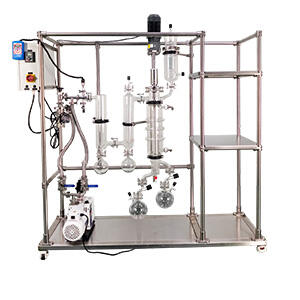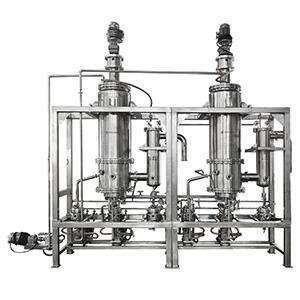Studiu de caz tipic privind aplicarea echipamentelor de distilare moleculară
Prezentare generală
Distilarea moleculară este o tehnică de distilare realizată în condiții de vid înalt, având caracteristici precum temperatură scăzută de distilare, grad înalt de vid, timp scurt de încălzire și eficiență ridicată de separare. Această tehnologie este deosebit de potrivită pentru separarea și purificarea substanțelor cu punct de fierbere ridicat, sensibile la căldură și ușor oxidabile. Yuanhuai a acumulat o experiență vastă în cercetarea, dezvoltarea și aplicarea echipamentelor de distilare moleculară. În continuare se vor demonstra aplicațiile reușite din diferite domenii prin exemple specifice.
I. Exemple de aplicații ale echipamentelor de distilare moleculară în industria rășinilor
Aplicarea rășinii epoxidice pentru îndepărtarea impurităților
În timpul procesului de producție al rășinii epoxidice, produsele conțin adesea impurități, cum ar fi epichlorhidrina, materialele compozite și produsele chimice electronice. Metodele tradiționale de separare nu pot îndepărta eficient aceste impurități, ceea ce afectează calitatea produsului. După adoptarea tehnologiei de distilare moleculară, fiecare componentă poate fi separată cu precizie în condiții de temperatură scăzută, impuritățile pot fi eliminate eficient, iar puritatea produsului poate fi îmbunătățită. Acest proces a fost aplicat cu succes în producția de produse din rășină epoxidică destinate domeniilor de vârf, cum ar fi aviația și prognoza meteo.
Aplicarea rășinii acrilice pentru îndepărtarea impurităților
În timpul procesului de producție a rășinii acrilice, se generează impurități cu punct de fierbere scăzut. Prezența acestor impurități va afecta vâscozitatea și conținutul de monomer insolubil al produsului. Prin aplicarea echipamentelor de distilare moleculară, condițiile de separare pot fi controlate cu precizie, impuritățile cu punct de fierbere scăzut pot fi îndepărtate eficient, iar puritatea și calitatea produsului pot fi îmbunătățite. Între timp, această tehnologie poate gestiona și diferite forme de produse din rășină acrilică, cum ar fi acoperiri și adezivi.
Aplicarea purificării rășinii fenolice
În timpul procesului de producere a rășinii fenolice, pot rămâne impurități precum fenolii monomeri. Prin distilare moleculară, conținutul de fenol monomer poate fi redus la un nivel relativ scăzut (de exemplu, sub 0,01%), ceea ce poate crește puritatea rășinii fenolice și poate îmbunătăți performanța acesteia.
Aplicarea purificării rășinii siliconice
În timpul sintezei rășinii de silicon, se produc diverse subproduse cu greutate moleculară scăzută. Aceste substanțe pot afecta stabilitatea termică și calitatea rășinii. Echipamentul de distilare moleculară poate separa cu precizie aceste subproduse, îmbunătățind puritatea rășinii și extinzând domeniul său de aplicare.
Decolorizarea și dezodorizarea produselor din rășină
Unele produse din rășină pot avea probleme, cum ar fi mirosuri neplăcute sau culoare necorespunzătoare, din cauza diverselor probleme apărute în timpul procesului de producție. Tehnologia de distilare moleculară poate elimina eficient substanțele mirositoare și impuritățile colorate din rășini, îmbunătățind calitatea acestora.
I I exemple de aplicații ale echipamentului de distilare moleculară în industria silicică
Aplicarea eliminării impurităților pentru monomerii de silicon
În timpul procesului de producere a monomerilor de silicon, se generează o cantitate mică de impurități cu greutate moleculară scăzută. Deși conținutul acestor impurități este foarte scăzut, ele au un impact semnificativ asupra performanței produsului final. Echipamentele de distilare moleculară pot îndepărta cu precizie aceste impurități minore în orice proces de producție a monomerilor de silicon, asigurând astfel că produsul îndeplinește cerințele de înaltă puritate. Această tehnologie a fost aplicată cu succes în procesul de purificare a diverselor monomere organosiliconice.
Optimizarea separării intermediarilor de silicon
În cazul intermediarilor organosiliconici, siloxanii ciclici, cum ar fi octametilciclotetrasiloxanul, sunt componente importante. Siloxanii cu structuri ciclice diferite prezintă diferențe în proprietățile fizice și chimice. Echipamentele de distilare moleculară pot realiza separarea și purificarea diferiților siloxani ciclici pe baza acestor diferențe.
Tratarea post-fabricație a polimerilor de silicon
În timpul procesului de producere a siliconului, există adesea substanțe monomere ne-reactive sau reziduuri de solvent, care pot duce la probleme precum scăderea performanței produsului sau transparența insuficientă. Echipamentul de distilare moleculară poate elimina impuritățile la o temperatură mai scăzută, poate îmbunătăți calitatea și aspectul produsului și poate spori performanța acestuia.
I I I evaluarea efectelor de aplicație
Conform statisticilor privind datele reale de aplicare, după adoptarea tehnologiei de distilare moleculară, puritatea produselor a crescut în general cu peste 95%, iar conținutul de impurități s-a redus sub 0,01%. În aplicațiile din industria rășinilor, stabilitatea termică a produsului a crescut cu 20-30%, iar în aplicațiile din industria siliconului, puritatea monomerului a atins standardul industrial de peste 99,9%
Concluzii și perspective
Aplicarea cu succes a echipamentului de distilare moleculară în industria rășinilor și în industria siliconilor demonstrează pe deplin natura avansată și caracterul practic al acestei tehnologii. Odată cu îmbunătățirea continuă a cerințelor privind calitatea produselor în industria chimică, tehnologia distilării moleculare va juca un rol important în mai multe domenii. Yuanhuai Technology își va continua angajamentul față de inovarea tehnologică și optimizarea echipamentelor, oferind soluții de separare mai eficiente, economisitoare de energie și prietenoase cu mediul pentru industria chimică. În viitor, odată cu dezvoltarea industriilor emergente strategice, cum ar fi materialele noi și energia nouă, perspectivele de aplicare ale tehnologiei distilării moleculare vor fi și mai largi. Suntem convinși că, prin inovare tehnologică continuă și optimizarea proceselor, echipamentele de distilare moleculară vor contribui mai mult la transformarea și modernizarea industriei chimice.

 EN
EN
 AR
AR
 BG
BG
 HR
HR
 DA
DA
 NL
NL
 FI
FI
 FR
FR
 DE
DE
 EL
EL
 HI
HI
 IT
IT
 JA
JA
 KO
KO
 NO
NO
 PL
PL
 PT
PT
 RO
RO
 RU
RU
 ES
ES
 SV
SV
 TL
TL
 ID
ID
 SR
SR
 UK
UK
 HU
HU
 TH
TH
 TR
TR
 GA
GA
 BE
BE
 BN
BN


